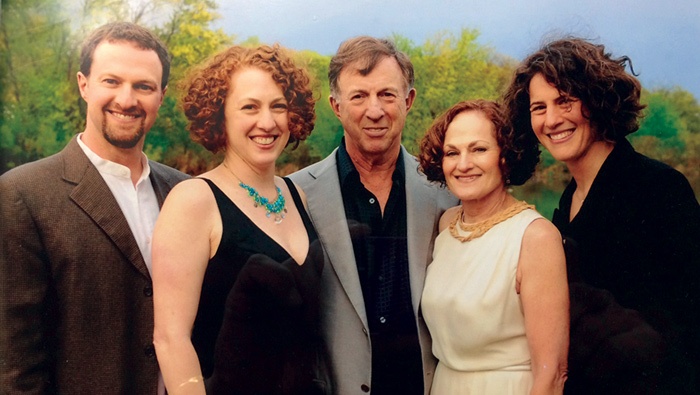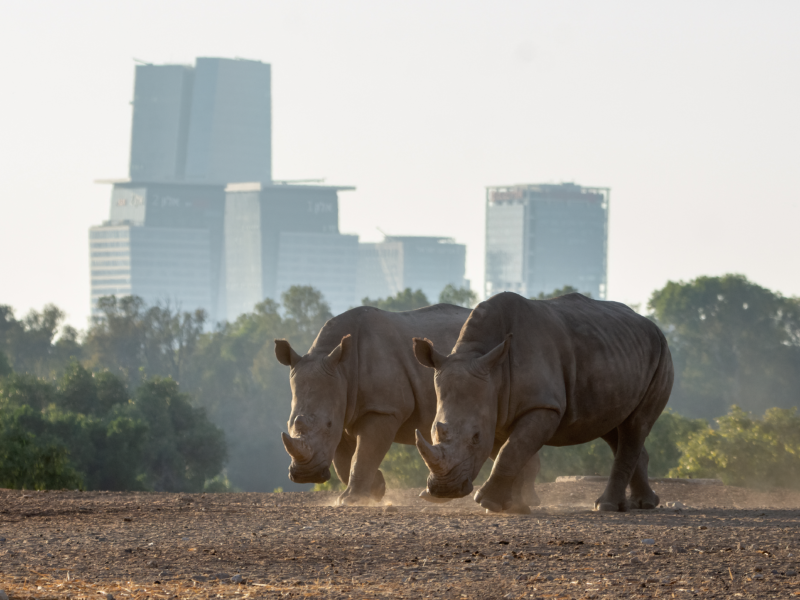Wandering among the vestiges of Jewish life in the village of Zagare, Leonard and Marcelle Joffe pieced together the world that his parents and her father had left behind when they fled Lithuania to start new lives in South Africa.
“We saw the remains of the old buildings where the mikvah was, the matzah factory and the shul,” says Leonard. “My mother had left incredible memoirs, so we were able to find all of these things. We almost certainly stood in the house that my mother grew up in.”
Like so many Lithuanian Jews in the 1920s, Leonard’s parents left Lithuania to escape the perils of pogroms, typhus and rising anti-Semitism. “My parents left their parents, knowing they would never see them again,” he says.
Marcelle’s father was one of eight children who escaped to South Africa as orphans, after their parents died during a typhus epidemic that swept through their village.
That courage to leave everything they knew not only saved their lives, but also opened up a world of opportunities for their children and grandchildren.
Marcelle, 71, and Leonard, 73, contrast this exodus with their own decision to emigrate from South Africa in the 1970s. Like most Jews in South Africa, they led comfortable lives – Leonard had his own medical practice in Johannesburg – and it took a different kind of courage to challenge the status quo of apartheid.
“You couldn’t become an activist because you’d be banned. You would lose your job at the hospital,” says Leonard.
So, like their parents before them, they left everything they knew to start over in a new country. However, they departed not under duress, but out of concern for their family’s future – and they had the comfort of knowing that they would see their parents again. On June 6, 1976, just 10 days before the large-scale Soweto student uprising began, the Joffes set out for America with their three young children.
“We’d never before set foot in America. It was like arriving in a new world,” Leonard says. They spent two years in Philadelphia while Leonard completed his fellowship at Wills Eye Hospital. Searching for warmer weather, they lived in New Orleans for a year. When a professional opportunity opened up in Tucson, they went to investigate.
“It was December and it was cold, and it was gray and it was dry,” Marcelle remembers. “But we came back in April, when it was spring and it was beautiful and warm. And we bought a house.” Three months later, they moved in and Leonard became the first Jewish South African doctor in Tucson.
They immediately connected with Tucson’s Jewish community, which they found to be exceedingly welcoming. The late Cantor Maurice Falkow of Congregation Anshei Israel even helped their son study for his bar mitzvah before their move with cassette tapes and phone calls, so that he was prepared for his big day just two months after their arrival.
Marcelle became active in the Women’s Division of the Jewish Federation of Southern Arizona, and over the years she served on the boards of Jewish Family and Children’s Services and the Tucson Jewish Community Center.
Leonard got involved with the Tucson Maimonides Society and served as synagogue president of Anshei Israel. He was named the Jewish Federation’s Man of the Year in 1992.
Grateful for the lives they built for themselves, the Joffes have made it a point to give back to the community. Marcelle volunteered with Angel Charity for Children, Inc. and the Pima County Medical Society Auxiliary. Leonard served as president of the Arizona Ophthalmological Society and volunteered as an eye surgeon with Orbis International’s flying eye hospital. Orbis provides ophthalmic instruction and surgical expertise to developing countries. As a retina specialist, he operated on patients and trained ophthalmologists in China, Romania and Morocco, but his most memorable trip was the one that took them to Lithuania in 1995 to trace their roots.
During that trip, while Leonard was in surgery, Marcelle visited the Jewish community center in Kaunus. “A little old lady came in … and she carried a plate that was covered with a napkin,” Marcelle says. “She’d heard that there were some people from America coming to the JCC. I took the napkin off and started crying. Sitting on this plate were taiglach (small, honey-coated pastries) that she had made. They looked and smelled exactly like the taiglach that Leonard’s mother was very well known for baking.”
“Like my mother came back and made them for us,” Leonard remembers.
One of the things that Leonard and Marcelle are quick to point out about their move from South Africa to Arizona is the wealth of opportunities that have been open to their children here. All three (of them) attended University High School. Steven, 49, and Hadine, 47, both went to Harvard University and now live in Boston with successful careers in medicine. Steven is a pediatric oncologist and is vice chairman and head of the Division of Biomedical Ethics at the University of Pennsylvania in Philadelphia. Hadine is a psychiatrist and is vice chair for research and director of the Division of Women’s Mental Health at Brigham and Women’s Hospital. Lindy, 46, graduated from the University of California, Berkeley, and Columbia University, New York, and is a successful pediatric occupational therapist in San Francisco. The Joffes are proud grandparents of three boys and three girls, ranging in age from 3½ to 17.
A visit with their grandchildren to a splash park in Boston inspired the Joffes to make a difference yet again. They brought the concept to the Tucson J, and, with financial support from Herk and Jill Rosenzweig and others, helped raise the $450,000 necessary to implement it, creating a playful water feature that attracts families year round. With an eye to the future they assisted in the campaign to raise money for the J’s recent capital campaign to ensure that the facility is able to expand and meet the community’s growing needs.
Looking back at the path that brought them to Arizona, Leonard says, “We never had any regrets, and we have no intent of ever leaving Tucson.”






